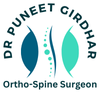Best Sciatica Treatment in Delhi
Sciatica is a symptom rather than a medical condition. It refers to pain that starts in the hip and buttocks and travels down the leg. This symptom is frequently accompanied by low back pain, which can be as severe or as mild as the leg pain. The term sciatica refers to a condition in which the sciatic nerve, which runs from the lower back through the buttocks and into the leg, is thought to be the source of pain.
True sciatica is a condition that occurs when a herniated disc or osteoarthritic bone spur compresses and pinches one of the sciatic nerve’s contributing roots. This is referred to as a pinched nerve. This type of lower back pain is less common than other back pain causes and conditions. Sporting activities, recreational activities, and heavy labor, for example, can cause back and leg pain, which is frequently misdiagnosed as sciatica. A physician’s challenge is distinguishing between radicular pain (also known as radiculopathy), which is caused by an inflamed nerve root, and referred pain, which is caused by a musculoskeletal sprain or strain.
What exactly is a herniated disc?
Herniation refers to a disc abnormality that is also known as a “bulging,” “ruptured,” or “torn” disc. This happens when the inner core of the intervertebral disc (nucleus pulposus) bulges through the outer layer of ligaments that surround the disc (annulus fibrosis). This fibrosis tear in the annulus causes pain in the back at the point of herniation. If a protruding disc presses against a spinal nerve, pain may radiate to the area of the body served by that nerve. Each vertebra in the spine contains a pair of spinal nerves that branch off from the spinal cord and travel to different parts of the body.
Any part of the skin that can feel hot and cold, pain, or touch sends that information to the brain via one of these nerves. In turn, pressure on a spinal nerve caused by a herniated disc causes pain in the area of the body served by that nerve. When a person is in their 30s or 40s, the nucleus pulposus is still a gelatin-like substance, which causes most disc ruptures.
Four Degrees of Disc Herniation:




What Are the Signs of a Herniated Disc or a Pinched Nerve?
The most common complaint is back pain. In some cases, there may be a history of episodes of localised lower back pain that begins in the back and travels down the leg served by the affected nerve. This pain is typically described as deep and sharp, becoming worse as it travels down the affected leg. The onset of pain from a herniated disc can be sudden or preceded by a tearing or snapping sensation in the spine, which is thought to be caused by a sudden tear of part of the annulus fibrosis.
A herniated disc typically causes lower back pain, which may or may not radiate to other parts of the body. When asked to bend forward or backward, they frequently have a limited range of motion, and they may lean to one side as they try to bend forward. They may walk with a painful gait at times, flexing the affected leg to avoid putting too much weight on the side of the body that hurts.
How do you know if you have a Herniated Disc or a Pinched Nerve?
A trained physician’s neurological history and examination will provide the most objective evidence of a herniated disc and pinched nerve. Although there are no laboratory tests that can detect the presence or absence of a herniated disc, they can aid in the diagnosis of unusual causes of nerve root pain and irritation. In cases where multiple nerve roots are involved, an EMG (electromyographic test) may be used to determine which nerve root is being pinched or is not functioning normally. An MRI is the preferred method of diagnosing a herniated disc.
What is the Treatment for a Herniated Disc/Pinched Nerve?
Surgery is not usually recommended for the vast majority of people who have a herniated disc. Non-surgical treatments. Controlled physical activity is the mainstay of non-surgical treatment. Treatment will typically begin with avoiding exacerbating activities, followed by a gradual return to normal activities. Sitting is bad for this condition because it puts a lot of stress and pressure on the lumbar spine, which can put more pressure on the affected nerve root. Medication administration is a critical component of non-surgical treatment.
Best Sciatica specialist doctor in Delhi
Anti-inflammatory medications, analgesics, muscle relaxants, and tranquilizers are examples of such medications. Furthermore, the right doses of aspirin have been shown to help with herniated discs. Physical therapy is also essential.
